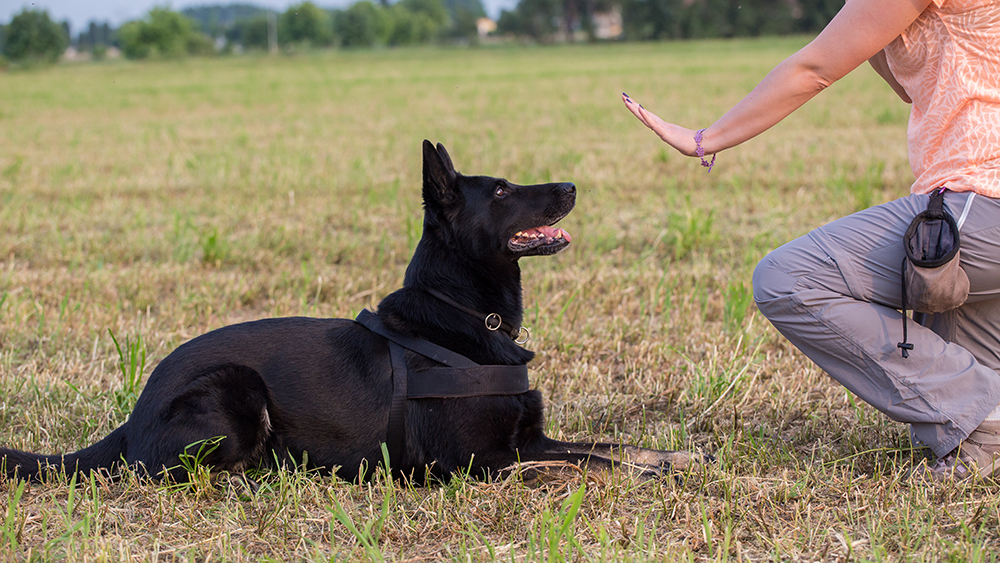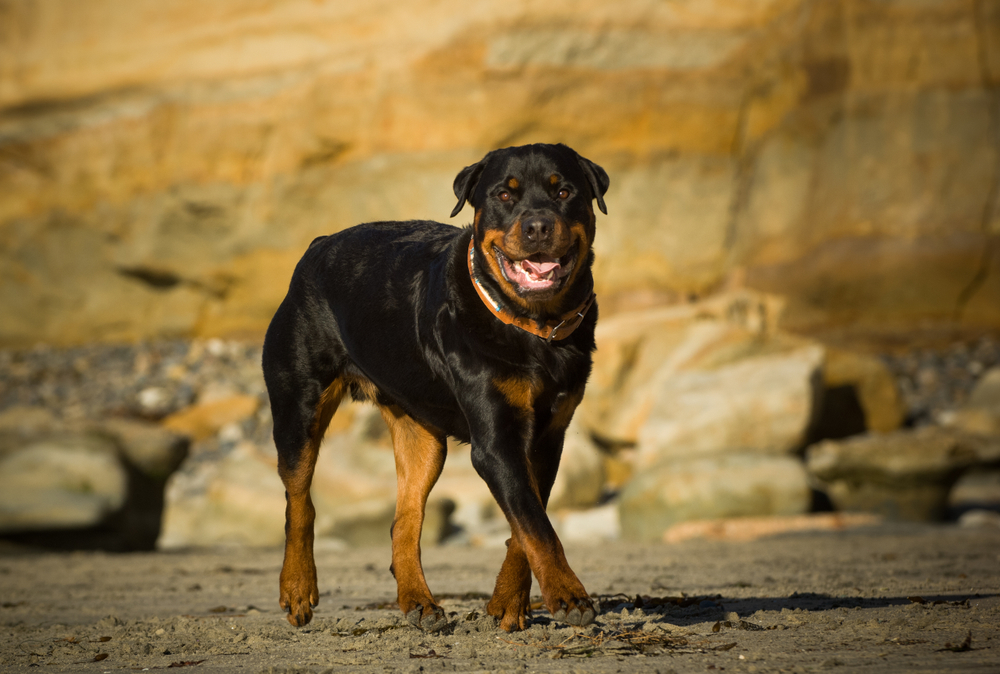Click Below to Skip Ahead
The Afghan Collie is a mixed breed resulting from pairing an Afghan Hound with a Border Collie. This is a truly unique hybrid, as these two dogs differ in many ways. With the extremely high energy and eagerness-to-please characteristics of the Border Collie and the regal and noble stature of the Afghan Hound, this designer breed certainly demands attention. Read on to learn more about what potential owners should expect when adopting an Afghan Collie.
Breed Overview
Height:
18–29 inches
Weight:
30–70 pounds
Lifespan:
12–15 years
Colors:
White, red, brown, black, sable, cream, silver, gold
Suitable for:
Experienced dog owners, active families with older children
Temperament:
Loyal, affectionate, energetic, loving
The Afghan Collie is a hybrid dog breed that blends the loyalty and sensitivity of the Afghan Hound with the high intelligence and energy level of the Border Collie. They have a mischievous side to them and a sense of humor that makes living with them never dull.
Afghan Collie Characteristics
Afghan Collie Puppies
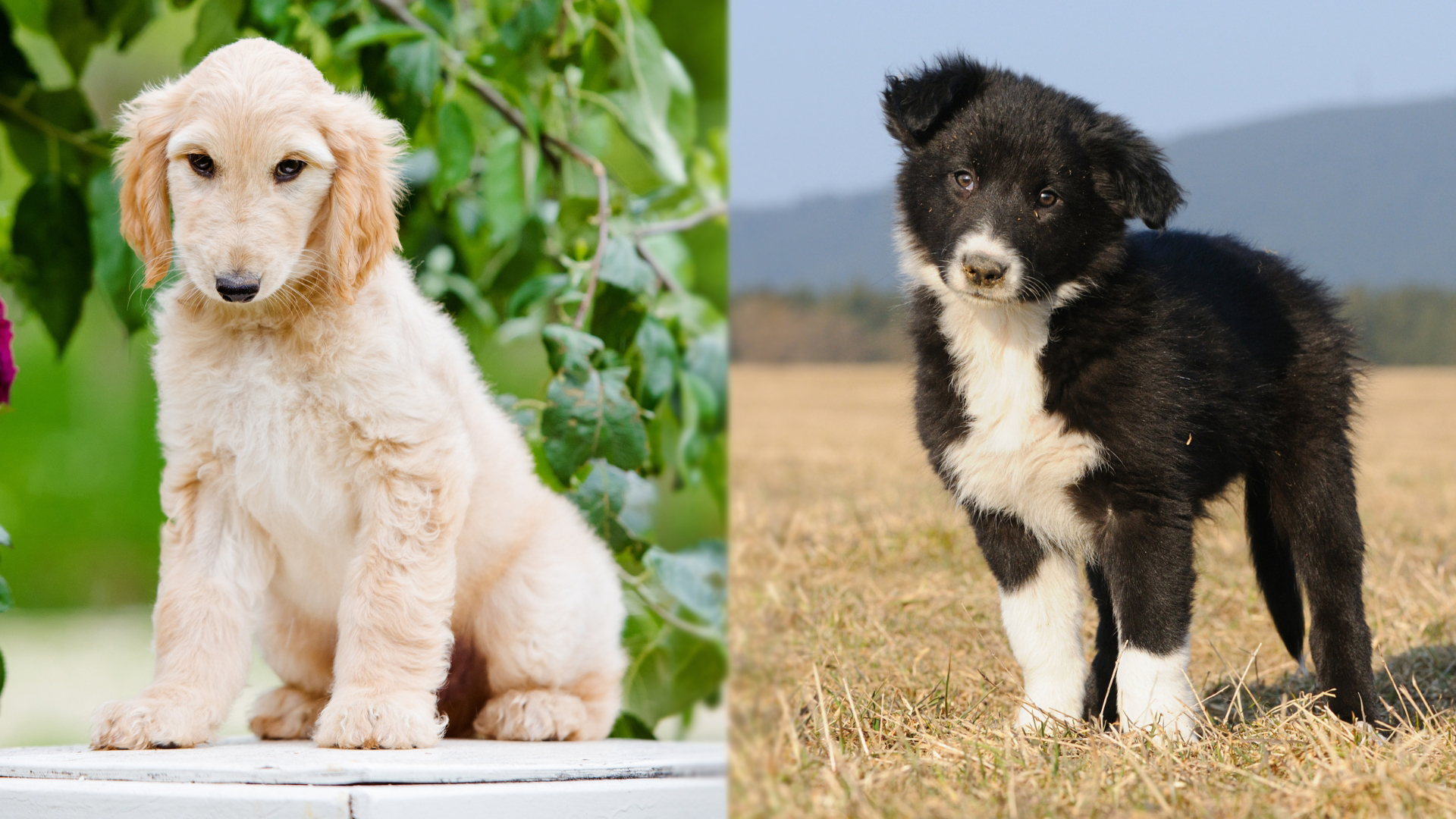
Afghan Collies aren’t a very popular hybrid breed, at least not like some designer breeds like Goldendoodles. For this reason, finding a breeder that specializes in this hybrid might pose a bit of a challenge.
Soon-to-be dog owners with their hearts set on adopting an Afghan Collie may have better luck scouring their local rescues and humane societies to see if there are any available puppies. We also recommend using PetFinder.com to search for Afghan Collie mixes. This website allows potential pet owners to browse animals from within its network of over 14,000 shelters and rescues.
Afghan Collie Breed Origin & History
The Afghan Collie is a relatively new hybrid dog breed, so little is known about its origin. However, the parent breeds are well-established and much loved.
The Afghan Hound is an ancient breed belonging to the Middle Eastern sighthounds. Their ancestors date back to the time of Egyptian pharaohs, and for centuries, Afghan Hounds were isolated to the Afghan Mountains. They were first brought to England during the 20th century and quickly became a prized breed in the dog show world.
Border Collies are a much newer breed, initially developed for herding livestock on farms in Great Britain in the 1700s. Their ancestors are thought to be other collie types, including the Bearded and the Scotch Collie. Early Border Collies were exported from Great Britain to the United States to sheep farms and ranches, an activity they still love to do today.
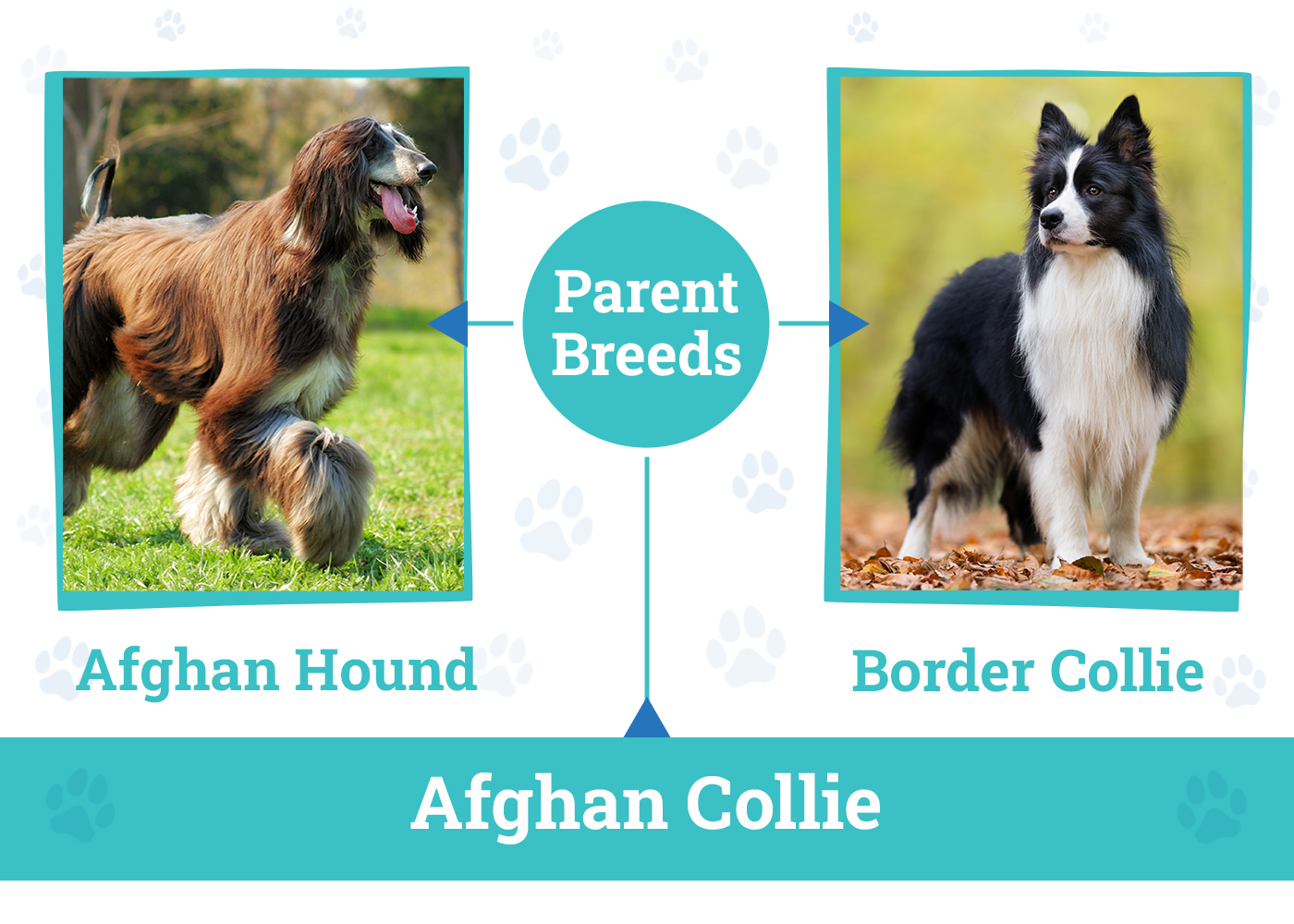
Temperament & Intelligence of the Afghan Collie 🧠
The temperament of any hybrid dog breed can be a mixed bag, given that each puppy will take traits from both of their parents. However, in the case of the Afghan Collie, temperament can be even more unpredictable as Afghan Hounds and Border Collies are very different dog breeds. This can make it impossible to know what to expect temperament-wise, as each puppy will be different from the next.
Afghan Hounds are known for their calm and somewhat aloof nature. They’re slightly reserved but very affectionate and loyal to their human caretakers. They are generally happy, sometimes goofy, and always aristocratic in nature. Afghan Hounds are somewhat of a contradiction in that they can be fiercely brave and also timid, flighty but occasionally lazy, and dignified but silly. Their persona ranges from loving sidekick to standoffish. If they’re not properly trained or socialized, they can even become somewhat feral.
Border Collies were bred to herd sheep and work closely with their handlers. They always make serving their owners their top priority. Even those who don’t herd sheep are incredibly eager to please their humans. Border Collies are known for their loyalty, high intelligence, and excellent sidekick capabilities. They thrive in environments where they’re always given something to do. If a Border Collie isn’t stimulated enough, they often find themselves getting into mischief, much to their owner’s chagrin.
The intelligence of the Afghan Collie can go either way, too. The Afghan Hound is ranked as one of the least intelligent dogs, while Border Collies are at the top of the intelligence chart. While the latter isn’t known for their high intelligence, that doesn’t mean that they’re “dumb.” They just don’t always succeed at following directions after a single request like their Border Collie counterparts.
Are These Dogs Good for Families? 👪
The Afghan Collie can be a good fit for some families, though these pups will generally do better in households with older children.
They can tolerate kids with supervision, though they may not be overly playful, especially if they take after their Afghan Hound side. This breed is known for their sensitivity, so they may find the rowdy and loud nature of children to be overwhelming.
Pups who favor their Border Collie side, however, will be much better suited for family life. Border Collies are highly energetic dogs with even temperaments, which makes them fantastic for homes with children. Don’t be surprised if they try to herd your children. It is possible to out-train their tendency to herd humans if you begin teaching them it’s not appropriate right from the get-go.
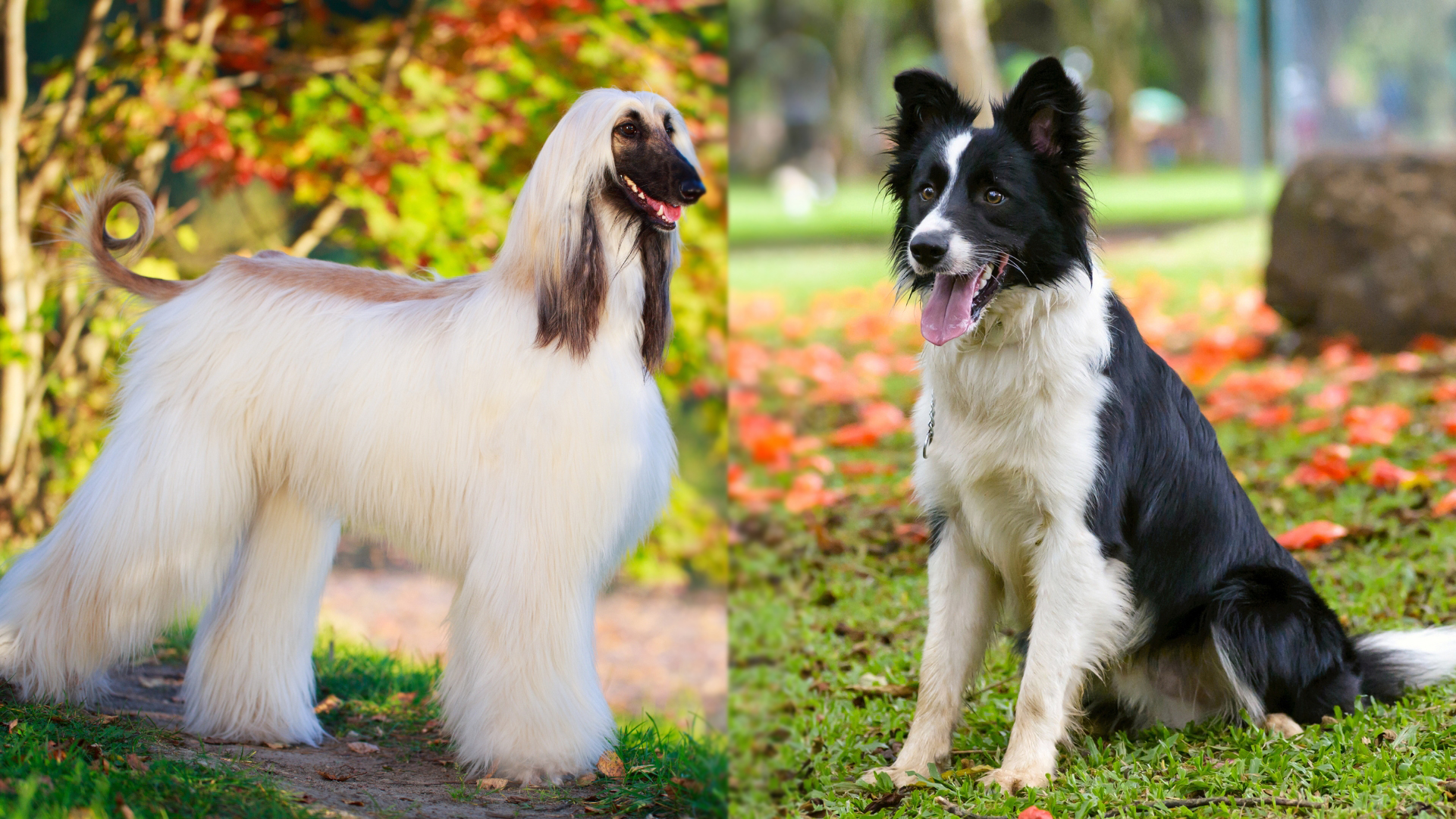
Does This Breed Get Along With Other Pets? 🐶 😽
The Afghan Collie can get along with other pets, especially if they’re similarly sized and raised together. However, again, it truly depends on which parent breed your dog favors.
The Afghan Hound’s hunting background can be problematic in households with smaller dogs, cats, or pocket pets. Your pup may look at the other animals as prey, not as playmates, which can make getting along and living together harmoniously almost impossible.
Border Collies can get on well with other dogs and cats, though their strong herding instincts may mean they spend their day trying to herd the other family pets.
All that said, some dogs are just not meant to live alongside other pets. You can increase the likelihood of a succession integration by ensuring your Afghan Collie is properly socialized and trained.
Things to Know When Owning an Afghan Collie:
Food & Diet Requirements 🦴
The Afghan Collie should be fed high-quality commercial dog food that’s been formulated for their life stage. Owners should consider diets with high protein content to support their dog’s high activity and muscle requirements, especially if their pup has inherited the Border Collie energy levels.
Obesity is less of a concern in the Afghan Collie, but that doesn’t mean that portion control should go out the window. You’ll want to ensure you’re feeding your pup enough food to support their health and physical activity without overfeeding them.
Puzzle feeders are a great way to encourage your pup to slow down while eating and provide some much-needed mental stimulation.
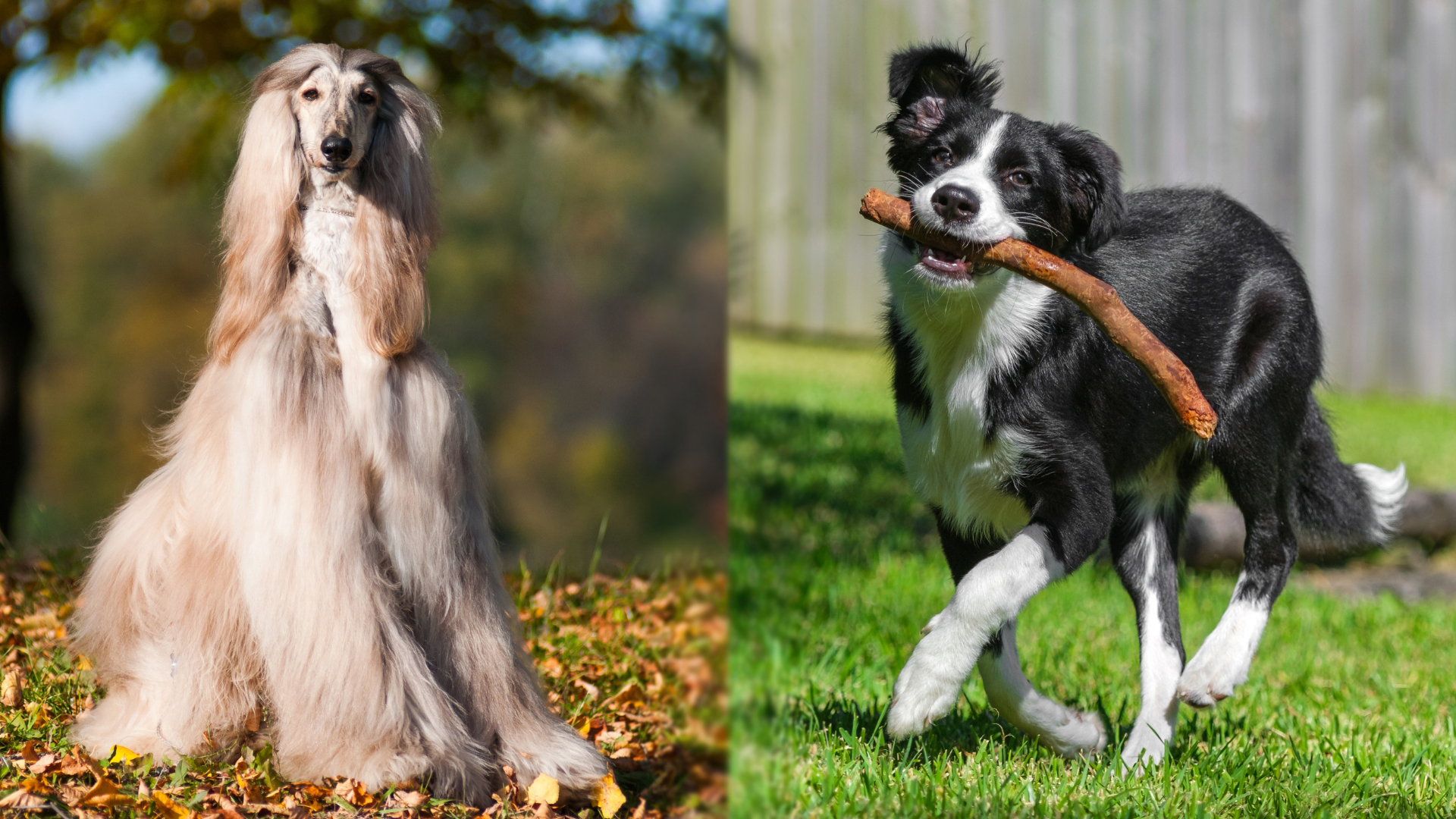
Exercise 🐕
An Afghan Collie’s exercise requirements are relatively high, even more so if they take after their Border Collie parent.
Owners should expect to take their pups out for, at minimum, 90 minutes of exercise daily. This can be split across several walks, but it can also include fun activities like playing fetch and agility. Playing games with your dog can enrich their lives and strengthen your bond.
If your pup has exceptionally high energy like their Border Collie parent, you’ll be looking at much more physical activity every day. This breed can require as much as two to three hours of vigorous exercise to meet their energy needs.
Training 🎾
Training is an absolute must for an Afghan Collie. How easy training them will be will depend entirely on which parent breed your pup takes after.
Afghan Hounds can be very challenging to train as they’re stubborn and very sensitive to harsh correction. This can lead to a refusal to obey and frustration on both parties’ part.
Border Collies, on the other hand, are fast learners and very eager to please. These two traits make training them very easy. However, their high energy and intelligence can make training sessions challenging for their owners at times.
The key to successfully training your Afghan Collie is to gain their confidence, make them think the training sessions were their idea, and switch things up consistently. Long, boring, repetitive sessions will make both of your lives difficult.
Grooming ✂️
The grooming requirements of an Afghan Collie will depend entirely upon which parent your pup looks more like.
Dogs taking after their Afghan Hound parent will require considerable time for coat care. These dogs are known for their thick, silky hair. They’ll need their coat combed and brushed regularly to prevent matting. Also, if they inherit the Afghan Hounds floppy ears they should have weekly checks and cleaning to prevent infections.
The Border Collie’s grooming requirements aren’t anything to scoff at, either. Their medium-length, double-hair coats shed regularly and will require regular baths with a quality shampoo and brushings to keep them looking their best and prevent matting.
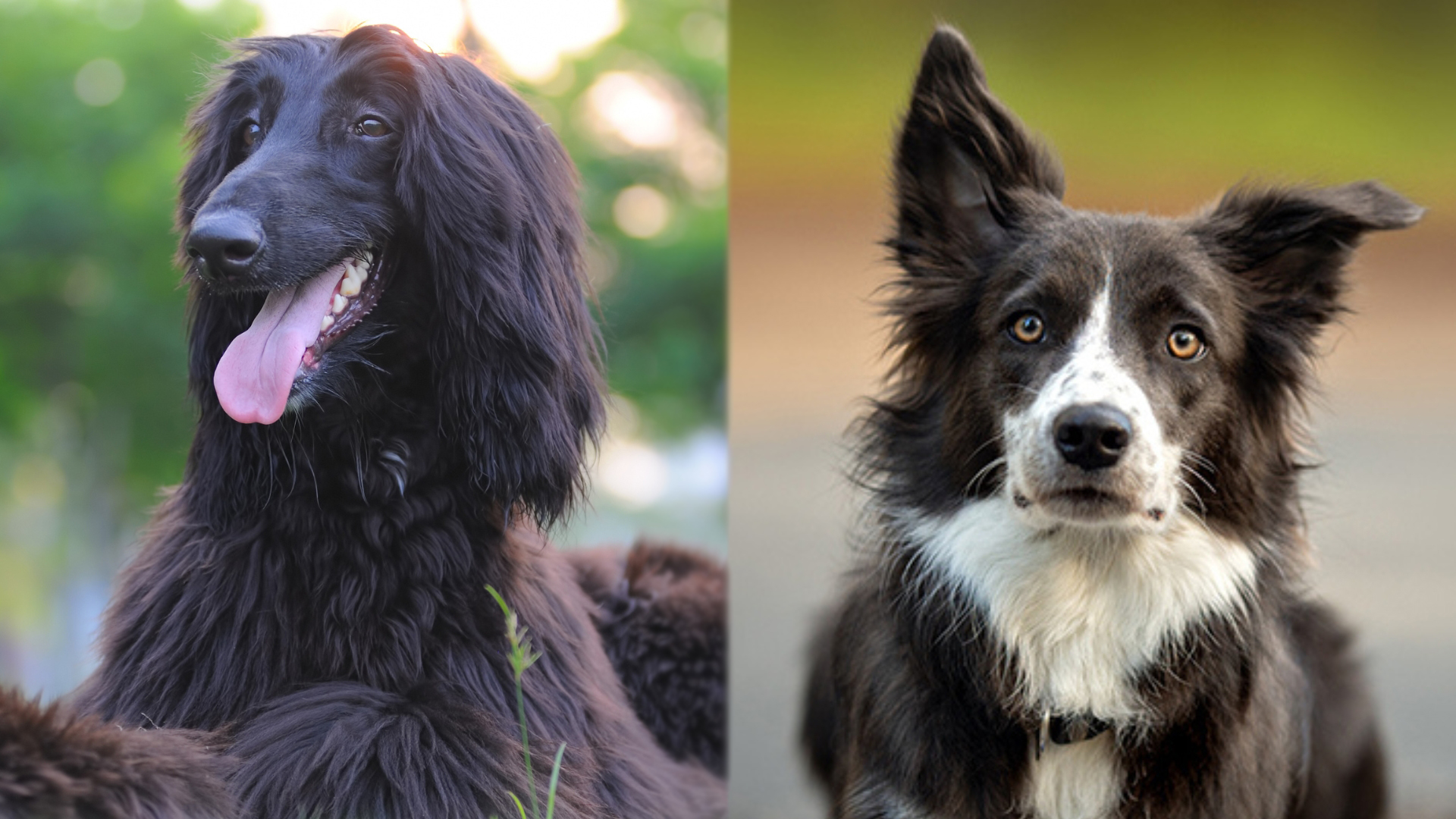
Health and Conditions ❤️
The Afghan Collie should live a relatively long and healthy life. This breed is not particularly susceptible to any significant health concerns, but they can develop some of the same conditions as the parent breeds.
Afghan Hounds can develop ailments such as hip dysplasia, cataracts, and necrotic myelopathy.
Border Collies can also develop hip dysplasia. The breed is also prone to conditions such as epilepsy, collie eye anomaly, multidrug resistance mutation, trapped neutrophil syndrome, and neuronal ceroid lipofuscinosis.
- Early-caught eye conditions
- Hip dysplasia
- Neuronal ceroid lipofuscinosis
- Trapped neutrophil syndrome
- Epilepsy
- Multidrug resistance mutation
Male vs Female
The most significant difference between male and female Afghan Collies is their size. Males are generally taller and heavier than their female counterparts in both Afghan Hounds and Border Collies, so the same applies to their offspring.
Any personality differences between sexes are purely anecdotal.
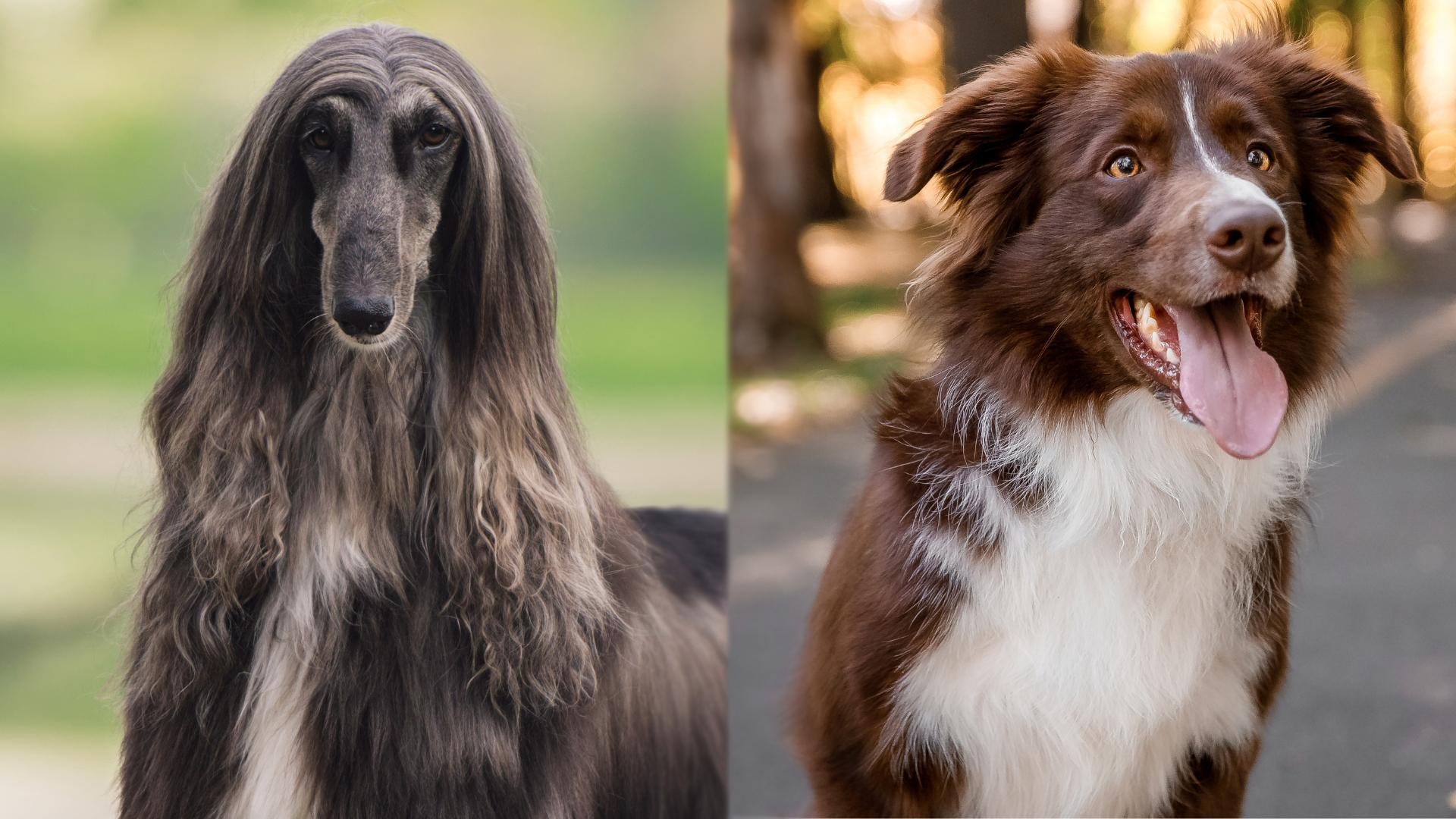
3 Little-Known Facts About the Afghan Collie
1. Afghan Collies can be sensitive.
Both Border Collies and Afghan Hounds are sensitive to sounds, so it makes sense that their offspring would be, too. They may get anxious during fireworks displays or thunderstorms, and living in extremely loud environments can be challenging for them.
2. Afghan Collies may develop wanderlust.
Some dog breeds are more likely to wander than others. Unfortunately for Afghan Collie owners, their pups may have a strong desire to explore their world if they become fascinated with a scent trail or find a critter to chase after. The saving grace is the fact that Border Collies are less likely than Afghan Hounds to develop wanderlust.
3. Afghan Collies don’t like to be left alone.
Border Collies and Afghan Hounds bond very closely with their humans and generally do not like being away from them for too long. If left on their own, they may panic, cry, whine, or even develop severe separation anxiety.
Final Thoughts
The Afghan Collie is a rare hybrid pup that results from pairing two very different dog breeds. With that in mind, it’s almost impossible for anyone to guesstimate not only the temperament of an Afghan Collie puppy but the appearance, too. Even puppies from the same litter can be polar opposites.
However, the parent breeds do have a few similar traits. They’re incredibly loyal and affectionate toward their humans. They forge very tight bonds—sometimes with just one person in particular—and can get along with children, though they may prefer quieter households. This may not be the right breed for homes with other animals, especially cats or pocket pets, as the Afghan Hound’s high prey drive and the Border Collie’s tendency to herd can make life for the other pets unpleasant (or even downright dangerous).
Finding an Afghan Collie breeder may prove impossible, but that doesn’t mean there aren’t any pups in shelters or humane societies near you. Use the internet to scour your local rescue’s websites to see if any Afghan Collies are awaiting their forever homes in your area.
While this can be a challenging breed to raise at times due to their high energy level and slight stubbornness with training, owning an Afghan Collie will undoubtedly be a rewarding experience with lots of love and beautiful memories to be shared.
See also:
- Afghan Retriever: Breed Info, Pictures, Care Guide & More
- Afghan Spaniel: Info, Pictures, Care Guide & More
Featured Image Credit: (L) Irma07, Shutterstock | (R) Anna Dudkova, Unsplash






